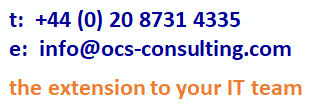Many large corporations are outsourcing their IT departments to gain significant commercial advantage; but what about smaller companies…how can SME's achieve the same result?
Support Packages | Key benefits
Drivers for IT outsourcing are many and various, though generally the underlying reasons may be summarised as cost, consistency and control. Large corporations have successfully pursued partial and in some cases full IT outsourcing with vigour. In many cases this has led to significant cost savings and operational efficiency improvements which have in turn validated the outsourcing decisions made.
Generally smaller organisations have struggled to utilize the same approach. Size is sometimes seen as a barrier to IT outsourcing and there is a perception that an organisation has to be large to gain the benefits and flexible options available. OCS’ IT outsource service for SME’s now challenges that situation.
OCS provides IT services in a variety of diverse markets and this has given OCS the insight into how to apply the benefits of corporate IT outsourcing on a smaller, SME scale. To do so, OCS assessed IT delivery functions and responsibilities between these distinctly different organisational types. From this analysis OCS identified the key aspects of an IT outsource that need to be applied to a smaller organisation and established a model which could be delivered to small companies offering the same levels of benefits, flexibility and scalability being enjoyed by their larger neighbours.
When outsourcing IT an SME needs to ensure five key services are available, namely: Management, Support, Monitoring, Recovery and Scalability. The capacity required of each service will be dependent on the use of IT within the SME and its business. As such OCS has created a capacity to implement on an individual basis the full range of services.
In practical terms what does this mean for an SME whose IT is outsourced to OCS?
- Collaborative – IT plans and implementation is aligned to the business plans and needs
- Consistency – service delivery levels (stated, measurable and monitored) for the users and the business
- Completeness – range of skills and experiences available from a pool of technical resources
- Correctness – IT solutions offered are best practice based on budget, timescales and resources, particularly skills, culture and capacity within clients user base
- Control – budgets (capacity and financial are set and used to measure and guide performance)
IT Outsourcing Services Guide
Support Packages
- each client has their own bespoke service package, which includes:
- IT Management
- IT Management and planning support for budget setting, business requirements and planning
- monthly IT performance reports that outline the services, activities and budget expenditure
- quarterly reviews to assess the outsource services, budgets and delivery and prepare for business activities.
- Helpdesk facilities
- Incident logging, tracking and reporting
- Client review of incident statuses via the web
- Liaison during service delivery, including trigger for escalation manager where necessary
- Response and Resolution Targets (SLA’s)
- multiple levels of support levels encompassing third party specialist application support providers
- Range of service hours to cover ad-hoc extensions or 24x7 operations where required
- Standard and tailored support procedures for seamless integration to existing support teams
- Infrastructure and Application Support
- Servers, networks and workstations
- Mobile and remote users
- Thin, fat and hybrid environments
- Packaged, customised and bespoke applications
- Technical Labs
- Offsite investigations and analysis
- Enhancement and project working environments
- Hosting of client hardware (servers and workstations) as part of service integration
- Other services
- Backup and recovery
- Planned maintenance / support / enhancement services
- Application and system testing and assurance
- 3rd party software support and maintenance management.
Key Benefits
- Balance - matching risk, investment and business benefit for IT infrastructure, systems and applications
- Flexibility - create the support package to suit the business needs that increases or decreases as the business demands
- Communications - help desk facilities: all service are on call / email away
- One stop shop for support needs - can cover multiple requirements, concurrently and with agreed response and resolution timescales
- Integration - services can be delivered onsite or remotely with project undertaken at OCS' labs where appropriate
- Best practice - wide range of skilled resources at your fingertips ensure services are continually evolving and moving with industry best practice.


